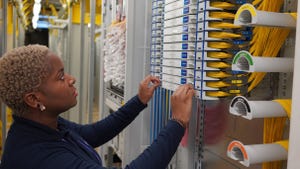Core Blimey! Tellabs Buys WiChorus
Tellabs follows Cisco's lead and buys a wireless packet core specialist, paying $165 million in net cash for WiChorus
October 22, 2009

The next-generation mobile packet core is gearing up to be one of the key battlegrounds in the telecom equipment market.
Only days after Cisco Systems Inc. (Nasdaq: CSCO) announced the planned $2.9 billion acquisition of Starent Networks Corp. (Nasdaq: STAR), Tellabs Inc. (Nasdaq: TLAB; Frankfurt: BTLA) announced it's buying WiChorus Inc. for $180 million. (See Tellabs to Buy WiChorus and Cisco to Buy Starent for $2.9B.)
Cisco's move complements its existing IP router business. Tellabs' move complements the position it has built in mobile backhaul.
And that makes sense, according to Heavy Reading senior analyst Patrick Donegan, a leading authority on the mobile backhaul market. "In the transition to all-IP-oriented 4G wireless architectures, there is a collapsing of the transport and core network domains," he says. "Tellabs is looking to leverage its large installed base in the backhaul network to be a leader as and when these two come together."
The deal will cost Tellabs $165 million net, as WiChorus, which came to many people's attention when it landed the packet core equipment deal at WiMax service provider Clearwire LLC (Nasdaq: CLWR), has about $15 million cash in the bank.
The move, which is agreed and signed, and now just requires clearance by various authorities, pitches Tellabs against the biggest names in the telecom infrastructure business.
According to Heavy Reading senior analyst Gabriel Brown, who is just completing a new report on the Evolved Packet Core (EPC), the main players currently are Ericsson AB (Nasdaq: ERIC), Huawei Technologies Co. Ltd. , Nokia Networks , and Starent (soon to be Cisco). Alcatel-Lucent (NYSE: ALU) and ZTE Corp. (Shenzhen: 000063; Hong Kong: 0763) are also active.
And there's a chance one of those companies, or another player, will enter the frame by acquiring assets in the Nortel Networks Ltd. fire sale. (See Nortel's Next Auction: The Packet Core.)
Tellabs CEO Rob Pullen is, at least, putting on a brave face about those competitive prospects. On a conference call today he basically said the WiChorus platform is far superior, and that Tellabs will hold a 12- to 18-month advantage over the other players while they try to develop technology that can match WiChorus in terms of data throughput, simultaneous customer connections, and deep packet inspection (DPI) capabilities. "We have a next-generation platform today," he boasted.
Pullen says WiChorus has that advantage because it has been developed as a purpose-built platform for so-called "4G" networks -- Long Term Evolution (LTE) and WiMax -- and is also backwards-compatible to 3G. (See WiChorus Unveils LTE Packet Core, WiChorus Intros Gateway, and WiChorus Touts 4G Core.)
Check out the video below to get the WiChorus view on what it does.
{videoembed|182001}
So what is Tellabs getting for its cash?
WiChorus, which has raised $43 million from its backers, has about 100 staff (who will join Tellabs), four customers, and 10 trial engagements. (See Open Range Picks WiChorus Core, WiChorus Packet Core Is in the Clear, and WiChorus Nabs $18M in Funding Round.)
Tellabs says WiChorus is on track to ship equipment valued at between $6 million and $8 million this year, and that the net price it's paying is equivalent to about 6.5 times the value of shipments WiChorus has predicted for 2010. That puts the value of next year's projected shipments (not necessarily equivalent to top-line sales, due to revenue recognition rules) at about $25 million.
Pullen, though, says Tellabs expects to do better than the WiChorus estimates because it can sell the technology into its installed base of 120 backhaul customers, while at the same time integrating the WiChorus capabilities into its 8600 and 8800 backhaul platforms.
Tellabs is certainly buying into an expanding sector. Heavy Reading's Brown says the mobile packet core is one of the fastest growing parts of the wireless networks market, estimating that it will grow from $1.4 billion in 2008 (2G and 3G systems) to $2.4 billion in 2014, when it will include sales of EPC systems for LTE and WiMax networks.
But Pullen might also find himself with some partner and sales channel issues as a result of the WiChorus acquisition, according to Donegan: "This is a bold new move by Tellabs. It will be interesting to see how the company manages account relationships with some of its partners going forward. Ericsson and NSN, for example, are two major distribution partners for Tellabs' 8600 transport series that is widely deployed in mobile backhaul networks. Going forward, these partners are likely to find Tellabs positioning WiChorus against them in the mobile packet core."
— Ray Le Maistre, International News Editor, Light Reading
You May Also Like


.jpg?width=300&auto=webp&quality=80&disable=upscale)







